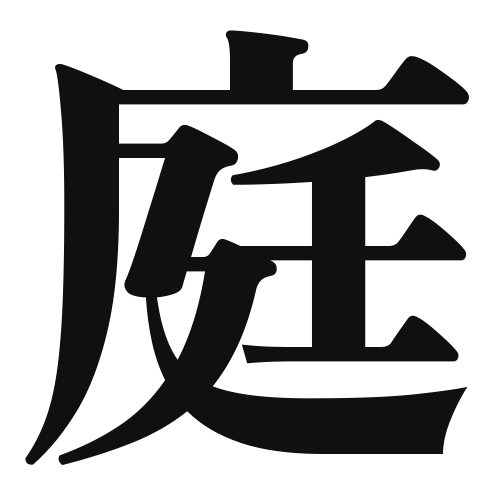1. Overview of Meaning
The kanji “庭” (niwa) means “garden” or “yard.” It refers to an outdoor space, often associated with plants, flowers, and a place for relaxation or recreation.
2. Formation and Radical
Formation of the Kanji: The kanji “庭” is a combination of two elements. It is a compound character that combines the radical for “house” (土) and the character for “garden” (庭). This reflects the idea of a garden being a part of a home.
Radical: The radical of “庭” is 土 (tsuchi), which means “earth” or “ground.” This radical is commonly associated with things related to land and nature.
3. Examples of Usage
Common Words and Phrases: Some common words that include “庭” are:
- 庭園 (ていえん, teien) – “garden” or “landscape garden”
- 庭仕事 (にわしごと, niwashigoto) – “gardening” or “yard work”
Example Sentences in Daily Conversation:
- 私の庭にはたくさんの花があります。
(Watashi no niwa ni wa takusan no hana ga arimasu.)
“There are many flowers in my garden.” - 週末に庭仕事をする予定です。
(Shuumatsu ni niwashigoto o suru yotei desu.)
“I plan to do some gardening this weekend.”
4. Synonyms and Antonyms
Similar Kanji: A similar kanji is “園” (en), which also means “garden” but often refers to a larger, more formal garden or park, such as a botanical garden.
Opposite Kanji: An antonym could be “荒れ地” (あれち, arechi), meaning “wasteland” or “barren land,” which contrasts with the cultivated and cared-for nature of a garden.
5. Cultural and Historical Background
Connection to Japanese Culture: Gardens hold significant cultural importance in Japan, often symbolizing harmony with nature. Traditional Japanese gardens are designed to create a peaceful environment and reflect natural landscapes.
Proverbs and Idioms: One common saying is “庭の花よりも、道の花” (niwa no hana yori mo, michi no hana), which translates to “Flowers by the road are more beautiful than those in the garden,” emphasizing the beauty found in unexpected places.
